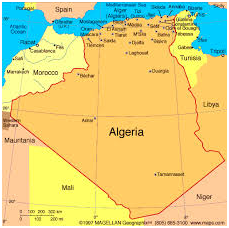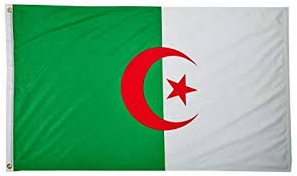
Algeria

Brief Overview
Large scale protests to oppose President Abdelaziz Bouteflika’s candidacy for a fifth term in office, erupted in February 2019, demanding his resignation, which took place in April. An interim president was inaugurated to oversee the transition period and organize the presidential election, due to be held in December 2019. The current political uncertainty has reduced levels of predictability in the business environment, given the impact the transition has had on senior managerial level in some large companies.
Algeria is one of a handful of countries that have achieved 20% poverty reduction in the past two decades. The Algerian government took significant steps to improve the wellbeing of its people by implementing social policies in line with the United Nations’ Sustainable Development Goals. The country’s oil boom has enabled the authorities to clear Algeria’s external debt, invest in infrastructure projects, and improve the country’s Human Development Indicators.
For example, Algeria has significantly improved its human capital development: its position on the World Bank Human Capital Index (HCI) that measures five key indicators in health and education is 93rd out of 157 countries. Between 2012 and 2017, its HCI value remained more or less constant at 0.52, however in 2017, it was lower than the average for its region and income group.
Algeria is considered to have achieved universal primary education with a 97% Primary Net Enrollment Rate in 2015 (with gender parity) and equally elevated higher education enrollment rates. Going forward, the government needs to improve the quality of education, as Algeria ranked 71 out of 72 economies for the performance of its 15-year-olds in science, mathematics, and reading in the 2015 PISA assessments.

The Republic of Algerial
Population: 41 million
Area: 2.4 million sq km (919,595 sq miles)
Major languages: Arabic, French, Berber
Major religion: Islam
Life expectancy: 75 years (men), 77 years (women)
Currency: Dinar UN, World Bank
Organisation: African Union, UN, World Bank

Physical Contacts of the Presidency
Name of Minister:
Address:
Telephone:
Fax:
Physical Contacts of the Prime Minister’s Office
Name of Minister:
Address:
Telephone:
Fax:
Physical Contacts of the National Assembly
Name of Speaker of the House:
Address:
Telephone:
Fax:
Physical Contacts of the Chief Of State and Cabinet Ministers
Name of Minister:
Address:
Telephone:
Fax:
Physical Contacts of the Ministry of Interior
Name of Minister:
Address:
Telephone:
Fax
Physical Contacts of the Ministry of Justice
Name of Minister:
Address:
Telephone:
Fax:
Physical Contacts of the Ministry of Foreign Affairs
Name of Minister:
Address:
Telephone:
Fax:
Physical Contacts of the Ministry of Women’s Affairs
Name of Minister:
Address:
Telephone:
Fax:
Physical Contacts of the National Human Rights Commission
Name of Minister:
Address:
Telephone:
Fax:
Physical Contacts of the Police
Name of Inspector General:
Address:
Telephone:
Fax:
Physical Contacts of the Military
Name of Inspector General:
Address:
Telephone:
Fax:
Important Information of Key Human Rights Issues in Cameroon
Number Prisons in Algeria
Number Prisoners in Algeria:
Secret Detention Centres:
Police Stations in Algeria
Are new forms of activism emerging in Algeria? Can civil society effect political reform in the country? The violence between radical Islamists and the military during the Algerian civil war of the 1990s led to huge loss of life and mass exile. The public sphere was rendered a dangerous place for over a decade. Yet in defiance of these conditions, civil society grew, with thousands of associations forming throughout the conflict. Associations were set up to protect human rights and vulnerable populations, commemorate those assassinated and promote Algerian heritage. There are now over 93,000 associations registered across the country. Although social, economic and political turbulence continues, new networks still emerge and, since the Arab revolts of 2011, organised demonstrations increasingly take place.
What are the current and ongoing human rights issues in Algeria?
(1) Freedom of the Press
(2) Human Rights Defenders Issues
(3) Impunity
African Union (AU)
Joined the OAU on 25May 1963
Signed the Constitutive Act of The African Union on: 28 February 2001
Ratified:09 November 2001
Instrument Deposited:19 April 2002
Signed:
Ratified:
Instrument Deposited:
Signed:
Ratified:
Instrument Deposited:
Signed: –
Ratified: –
Instrument Deposited: –
4.Protocol on Amendments to the Protocol on the Statute of the African Court of Justice and Human Rights
Signed: –
Ratified: –
Instrument Deposited: –
Signed: –
Ratified: –
Instrument Deposited: –
Signed: –
Ratified: –
Instrument Deposited: –
Signed: –
Ratified: –
Instrument Deposited: –
Signed: –
Ratified: –
Instrument Deposited: –
Signed: –
Ratified: –
Instrument Deposited: –
Signed: –
Ratified: –
Instrument Deposited: –
Signed: –
Ratified: –
Instrument Deposited: –
Signed: –
Ratified: –
Instrument Deposited: –
Signed: –
Ratified: –
Instrument Deposited: –
Signed: –
Ratified: –
Instrument Deposited: –